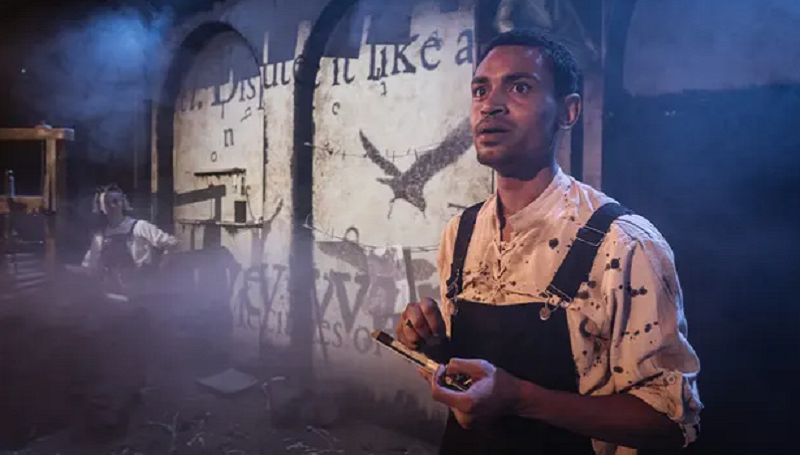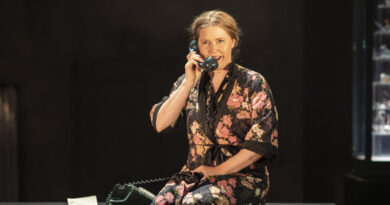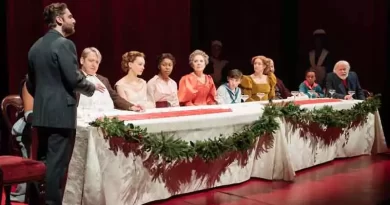“Compositor E” at Omnibus Theatre
Jeremy Malies in south London
1 October 2023
Playwright Charlie Dupré’s imagination and writing skills have been fired by several kinds of magic here: the actual magic portrayed in Macbeth, the mystery over the sparse information we have about Shakespeare’s life, and the continuing allure of traditional typesetting.
This original play has been longlisted for the Bruntwood Prize. It is in its second run (now with a modified text) after a premiere at the Network Theatre in Waterloo during the Vault Festival in February. A play about the printing of the First Folio is timely and has no doubt been prompted in part by the fact that this year is the 400th anniversary of publication. But even with the revisions, on this showing the piece is far from the finished article.
The play starts and finishes in 1623 with printer and publisher Isaac Jaggard preparing his huge volume at the London typesetting shop that he will soon inherit from his father. Jaggard is portrayed in sustained bursts of closely observed almost cinematic acting by Kaffe Keating. A painting of James I dominates the set created by Sophia Pardon with the monarch staring expectantly across the stage, and Keating’s character cannot wait to despatch a calfskin bound copy to the Palace of Whitehall.
Dupré chooses to focus on preparation of the text of Macbeth. A senior typesetter and frustrated poet, Richard Bardolph (played here by David Monteith), mentions that it is the favourite play of the witchcraft-obsessed monarch. Stage right, three junior printers stir a vat of ink in an obvious but effective nod to the play.
A thousand copies are being printed (a big run for the time) and Pardon shows us a convincing replica of a press in her design with rows of pages hung up to dry throughout the acting space. Director Marie McCarthy creates a frenetic pulse for the action, the tempo being dictated by the need to keep the hand-fed press running. McCarthy slows matters skilfully in reflective moments as Bardolph bemoans his stalled writing career and Jaggard thinks ahead to the imminent death of his unseen father, William, in an adjacent room.
The main character is John Leason played by Tré Medley. He is the mysterious Compositor E of the title. We know little about him other than his name though textual historians have noted that he could be erratic and may have been an apprentice. Dupré, who is scrupulous elsewhere in introducing known facts to the play, allows his imagination to take wing and portrays Leason as a 17-year-old working-class Lancastrian. Leason becomes the star compositor who can work at speed because the often difficult First Folio manuscript resembles the hand of his dead mother.
“It just goes in through your eyes and out through your fingers” is a refrain repeated by many of the characters. But Leason becomes too involved to the point of wanting to be a joint author. Jaggard tells him that he can tinker with words, remove lines, and (amazingly) even introduce lines of his own so that pages end in a way that is manageable on the press. I found myself looking up many printing terms such as “casting off” and the play educated me and I suspect others about how books were created at the time. The best acting of the night is perhaps by Keating and I found myself empathizing with his character as he panics over a possible rights lawsuit and reflects on his character’s unusual combination of both printing and publishing, a theme that Dupré might have developed further.
Dupré falters and is over-ambitious when he has Leason introduce his own mother into the portion of the plot of Macbeth that he has been given to typeset. She becomes conflated with the action in a way that is unclear. However, Leason’s analysis of Lady Macduff’s flight while he is agonizing over an unintelligible word is a high point as is his pleading with Bardolph (who has seen the whole text) about how the play will turn out.
Costumes (uncredited in the play text) are vaguely modern. This is a wise decision; doublet and hose amid all that ink would have been truly messy. Lighting and video design are by Rachel Sampley who succeeds in suggesting a second compositing workshop just offstage. In a wonderful sequence, Sampley has blocks of text fly in as back projection with the letters seemingly coming from the manuscript copy through Medley and Monteith’s compositing sticks and onto paper. I sat extreme stage left and was within touching distance of the older man’s workstation so that at times I was reaching for the type myself such was my involvement.
But a grandiose final monologue to the audience (and the future) by Medley as he clutches King James’s bound copy with a background of modern minimalist music fails to take wing. This play shows great promise and the unusual plot makes it a page-turner in every sense. Dupré is adept with overlapping dialogue and figurative language. But the evening left me unsatisfied overall despite wanting to see more of his work.









